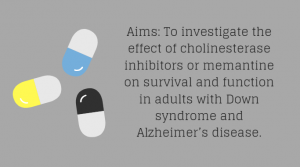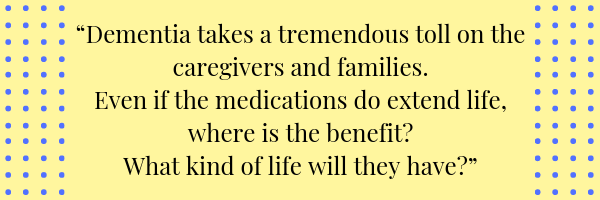In March 2018, 21 researchers published a study in the British Journal of Psychiatry called “Impact of cholinesterase inhibitors or memantine on survival in adults with Down syndrome and dementia: clinical cohort study.”
 The researchers noted that there have been few studies conducted, and therefore little information is available on how to treat adults with Down syndrome and Alzheimer’s disease. They set out to test specific antidementia drugs on people with Down syndrome and Alzheimer’s disease.
The researchers noted that there have been few studies conducted, and therefore little information is available on how to treat adults with Down syndrome and Alzheimer’s disease. They set out to test specific antidementia drugs on people with Down syndrome and Alzheimer’s disease.
In the most recent edition of the same journal doctors David S. Smith, (Director of the Down Syndrome Clinic of Wisconsin at Children’s Hospital in Milwaukee and member of the Down Syndrome Medical Interest Group), and Brian Chicoine, (Medical Director of the Adult Down Syndrome Center of Lutheran General Hospital in Park Ridge, Illinois) published a response to the March study.
Difficulties of diagnosing and managing dementia in people with Down syndrome
“As practicing clinicians who provide care to adults with Down syndrome, we appreciate Eady and colleagues’ attempt to address a real concern in this patient population. However, we have significant concerns about clinicians potentially using in their practice the conclusions drawn by the authors. The study conclusions offer false hope and may result in wasted resources.”
Smith and Chicoine take issue with several aspects of the study:
- There are major differences in two groups (those who did/did not receive the medications) involved in the study. Smith and Chicoine argue that the significance of the differences, including age, degree of intellectual disability, and progress of dementia symptoms, could make the results invalid.
- The study measured the survival time of the participants. (Those who took the medication survived an average of 2 years longer than those who did not.) Smith and Chicoine suggest that quality of life would be a better measure to investigate.

- Smith and Chicoine point to previous studies that they claim show there is “no benefit of pharmacological interventions for cognitive decline in people with Down syndrome.”
Finally, Smith and Chicoine point out that they fear doctors tend to over-diagnose Alzheimer’s disease in adults with Down syndrome who experience cognitive decline. They remind us that even though people with Down syndrome have plaques and tangles in the brain tissue, not all adults with Down syndrome experience dementia. They stress the importance of ruling out other possible causes of decline before a diagnosis of Alzheimer’s Disease is made.
The original study’s authors reply to Smith and Chicoine in the November journal. In it, they defend their procedures and results. They argue that medications have been shown to slow the rate of cognitive decline in patients without Down syndrome and reiterate the need for more research in this area.
Their final statement: “People with Down syndrome and dementia should not be denied access to antidementia drugs.”
It should be noted that Smith and Chicoine did not argue against the use of antidementia drugs in all cases. They merely took issue with the study’s design and argued for careful evaluation prior to an Alzheimer’s diagnosis in adults with Down syndrome.
Studies Mentioned:
David Smith and Brian Chicoine. Difficulties of diagnosing and managing dementia in people with Down syndrome. British Journal of Psychiatry, Volume 213, Issue 5 November 2018 , pp. 668-669. Published online: 19 October 2018
Eady, N, Sheehan, R, Rantell, K, Sinai, A, Bernal, J, Bohnen, I, et al. Impact of cholinesterase inhibitors or memantine on survival in adults with Down syndrome and dementia: clinical cohort study. Br J Psychiatry 2018; 212: 155–60.
Eady, N, Sheehan, R, Rantell, K, Sinai, A, Bernal, J, Bohnen, I, et al. (2018). Author’s reply to: Difficulties of diagnosing and managing dementia in people with Down syndrome. The British Journal of Psychiatry. 213. 669-669. 10.1192
Further reading: Dementia and People with Intellectual Disabilities

